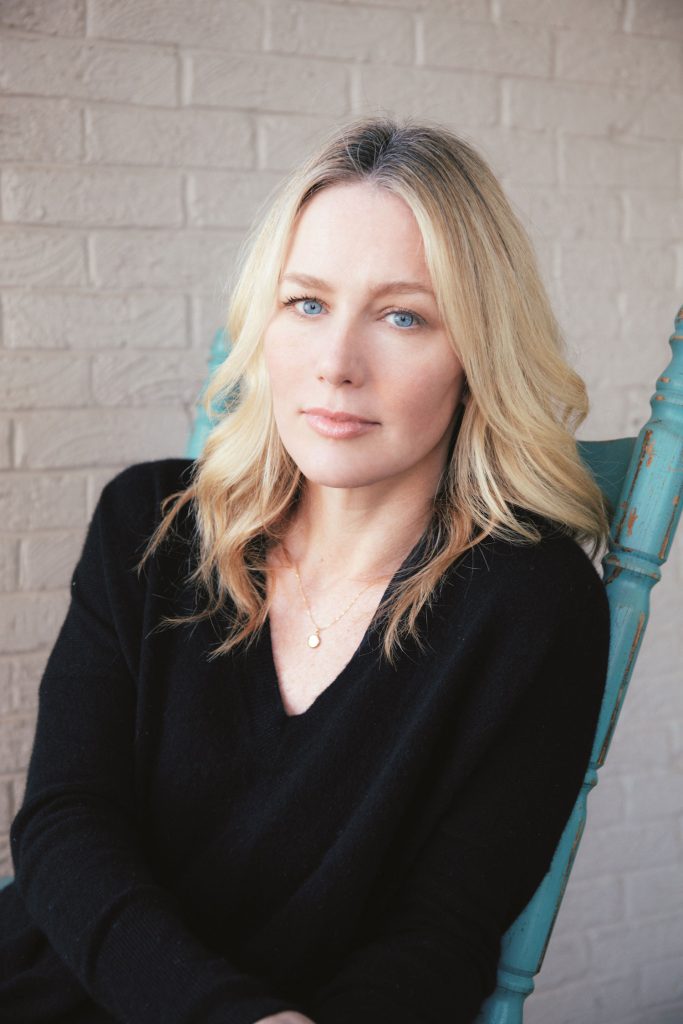
Once you write a memoir, all bets are off when it comes interviews. Allison Moorer is finding that out right now as she negotiates the media juggernaut prompted by the dual release of Blood: A Memoir (Da Capo Press) and equally stunning song-cycle companion piece Blood (Autotelic). “I’m just focused on staying centered and calm about it,” says Moorer.
Dealing head-on with the murder-suicide that claimed her parents when Moorer was just 14, the book enhances its narrative passages with vivid flashes of memory—much like the album punctuates its artful acoustic intimacy with fitful electric bursts. Both pieces of work benefit from an unflinching honesty and a tactile attention to detail that is spare yet elegant, with not a word wasted. Vocally, Blood is the Grammy-nominated singer’s most powerful—and vulnerable—performance, which is saying a lot when you consider the quality of her 20-year catalog.
It took some juggling of schedules, but MAGNET finally caught up with Moorer to find out more about Blood and how she’s weathering the media storm.
I’d argue that Blood is the best thing you’ve done since 2004’s The Duel, which was also a concept album.
Interesting comparison, but I do feel like Blood is a very different record. The person who made The Duel was questioning whether there is a God … Should I believe in God? The person I am now doesn’t have any questions about that. I choose to have faith simply because it’s a comfort. I see evidence of God all around me. Maybe that’s maturity. I don’t know.
A few of the songs were written earlier, correct? The title track was on 2015’s Down To Believing.
I had some songs I was writing that I thought might be a project with my sister (Shelby Lynne). But we decided to table that for now. I had “Nightlight” and “Bad Weather.” “Cold Cold Earth” already existed, as did “Blood.” “I’m The One To Blame” is a song that has a lyric found in my father’s briefcase after he died. Those are his words, and my sister put music to it when she found it.
Two early passages in the memoir were about the briefcase and your love of magazines. It’s nice to know people still appreciate our dying industry.
[Laughs] I come by the magazine habit honestly—I really do. We pick them up because we find them beautiful and we want our lives to look like what’s inside them—totally aspirational, totally unattainable. It’s about dreams.
As far as the album and the memoir being companion pieces, what was the creative process like for both?
I didn’t even decide to do an album until earlier this year. I finished the manuscript in June 2017. It wasn’t until that was edited, turned in and finished that it was suggested to me that it might be a good idea to make an EP to go with it. I took some of the songs I had and started to add to them. Clearly, it ended up being longer than an EP, but the songs kept coming and I couldn’t ignore them. The last one I wrote was “Heal,” which I did with Mary Gauthier.
The album has a bit of an edge, but it’s also quite intimate.
I had in mind that it would be completely acoustic, but some of the songs deserved a bigger treatment. (Producer) Kenny (Greenberg) and I started from scratch. There are only three additional musicians on the record besides the two of us. We just made it up as we went along and did what felt right.
How about creative process for the memoir?
Writing is really hard work. I’d take myself into what I call active memories … We think we remember everything, but we don’t really. I had a stack of index cards with things I wanted to cover. I had a lot of photographs and artifacts I would sit with to recall certain things. There were moments when I’d be stunned, holding onto the edge of my desk wondering how to put what had just come to me into words. Easy? Hell no. Worth it? Absolutely. It’s one of the best things I’ve ever done.
It’s interesting that you begin the book with your parents’ death.
I didn’t feel like it was fair to make the reader wait on that—you’ve got to get that detail out of the way. In the past, people would ask me about it, and I really didn’t think it was an appropriate topic for an interview that’s supposed to be about music. I didn’t see the point in introducing something that’s very painful for me into a conversation about something that’s supposed to be positive for me. I realize that a lot of journalists want to know about it and think it’s their right to know about it. But it really isn’t. I used to work as a journalist, so I understand the need for a good lede. But I can promise you that if somebody asked me about it and I answered them, nine time out of 10 it would be the lede. So that became the focus of the story—not the music I was trying to promote.
When did it become OK for you to talk about this stuff?
It took me writing a frigging book. Sometimes it takes me back into it, and that’s not necessarily a place I want to be at 3 p.m. on a Tuesday. I’ve been struggling with this issue my entire life—not just their deaths but also things that happened before that. I was feeling a lot of deep shame about it, and don’t think that’s something people realize. But I realize I’ve written this book and put these things out there, so I’m going to talk about it and do the absolute best I can with it, minute by minute.
—Hobart Rowland






